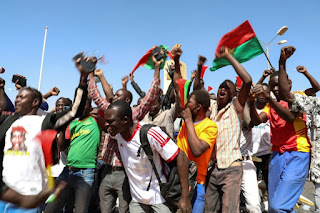Burkina Faso Is Another Coup Victim in Africa
Photo source: Al Jazeera
By Naveed Qazi | Editor, Globe Upfront
Burkina Faso’s army announced in late January 2022 that it had deposed President Roch Kabore, the government, and the national assembly. It had also suspended the constitution. On a state television, the army officers blustered that the coup had been done without carrying out violence in the country, and those detained were kept in a secure location. The statements, signed by Colonel Paul Henri Sandaogo, were made in the name of a previously unheard entity, the Patriotic Movement for Safeguard and Restoration or MPSR, according to its French language acronym. The army even chaired a 15-person technical committee charged with proposing a timeline for a transitional government that would lead the country to elections in near future.The coup was planned because of Kabore's inability to keep the nation together, mainly after twenty seven year rule of Compaore. There was also a failed coup in 2015, but this time the army were successful attaining power.
According to press reports by Al Jazeera, the army broadcast came after two days of confusion and fear in the capital Ouagadougou, where heavy gunfire erupted at army camps, with soldiers demanding more support to fight against various jihadist armed groups. Burkina Faso’s coup also came amid an escalation in attacks linked to al-Qaeda, and ISIS groups, which have killed thousands, and displaced around 1.5 million people. The number of extremist attacks have risen from nearly 500 in 2020 to more than 1,150 in 2021, placing Burkina Faso well ahead of Mali’s 684 and Niger’s 149 violent events. There were also some civilian protests in January 2022 which were met with suppression.
Invoking international reactions, United Nations chief Antonio Guterres said in a statement that he ‘strongly condemns any attempted takeover of government by the force of arms’. The United States reacted by saying that it was ‘deeply concerned’ about developments in Burkina Faso, and urged a swift return to civilian rule. When it comes to African Union and the West African bloc ECOWAS, they also pledged that they will hold the military responsible for Kabore’s safety.
Adama Gaye, a Senegalese political commentator, told Al Jazeera that ‘the failure to govern’ was at the heart of these recent events. ‘Anybody who has been monitoring the evolution of Burkina Faso expected this to happen, the writing was on the wall, clearly,’ Gaye said, about the military moves.
It was Lieutenant Colonel Paul Henri Sandaogo Damiba who was inaugurated as president in February 2022, where he was dressed in a camouflage uniform, a red beret, and wore a sash in the colours of Burkina Faso’s national flag.
The ex ruler Kabore was elected in 2015 following a popular revolt. He was re-elected in 2020, but the following year faced a wave of anger over the mounting toll from an increasingly bloody conflict that has spilled over from neighbouring Mali.
The move has been largely welcomed on the streets. It shows how exasperated the Burkinabe people have become with Kabore’s leadership as the country has endured years of deteriorating security amid a region wide Islamist insurgency. It was something similar what Guineans felt during the last coup there.
What mainly led to Kabore’s demise is his debauch spending on military expenditures. Burkina Faso’s military expenditures have had more than doubled under Kabore, from roughly $150 million when he first took office in 2015, to $382 million in 2020, according to the Stockholm International Peace Research Institute. It has been the United States which also has been supporting Burkina Faso with military spending since 2009, as part of America’s 9/11 counter terrorism goals. This support also kind of led a groundwork for increased militarism. In response to the last coup, the United States halted $160 million in aid.
In contrast to the deposed president, Damiba has sought to present himself as an expert in countering terrorism. A graduate of the military academy in Paris, he is the author of a book titled West African Armies and Terrorism: Uncertain Responses in which he analysed anti-terrorism strategies in the Sahel region and their limits. However, his plan for battling the armed groups remains unclear. Military rule, infact, will exacerbate the problems in Burkina Faso that have allowed extremism to thrive.
Colonial powers have also had a say in Burkina Faso’s political circles. Paris had expanded its military cooperation at ex President Kabore’s request, including the country’s involvement in its Operation Barkane battling armed groups in Africa Sahel’s region. After the coup, it also remains unclear whether Damiba may turn to Russia for security cooperation. Moscow, always, has been looking for an alternative to Western intervention. But, one of the fact, that remains highly unchallenged is a blind support to ruling regimes by outside powers, whether dictatorial leaders, or the military, for gaining access to natural resources.




Comments
Post a Comment
Advice from the Editor: Please refrain from slander, defamation or any kind of libel in the comments section.